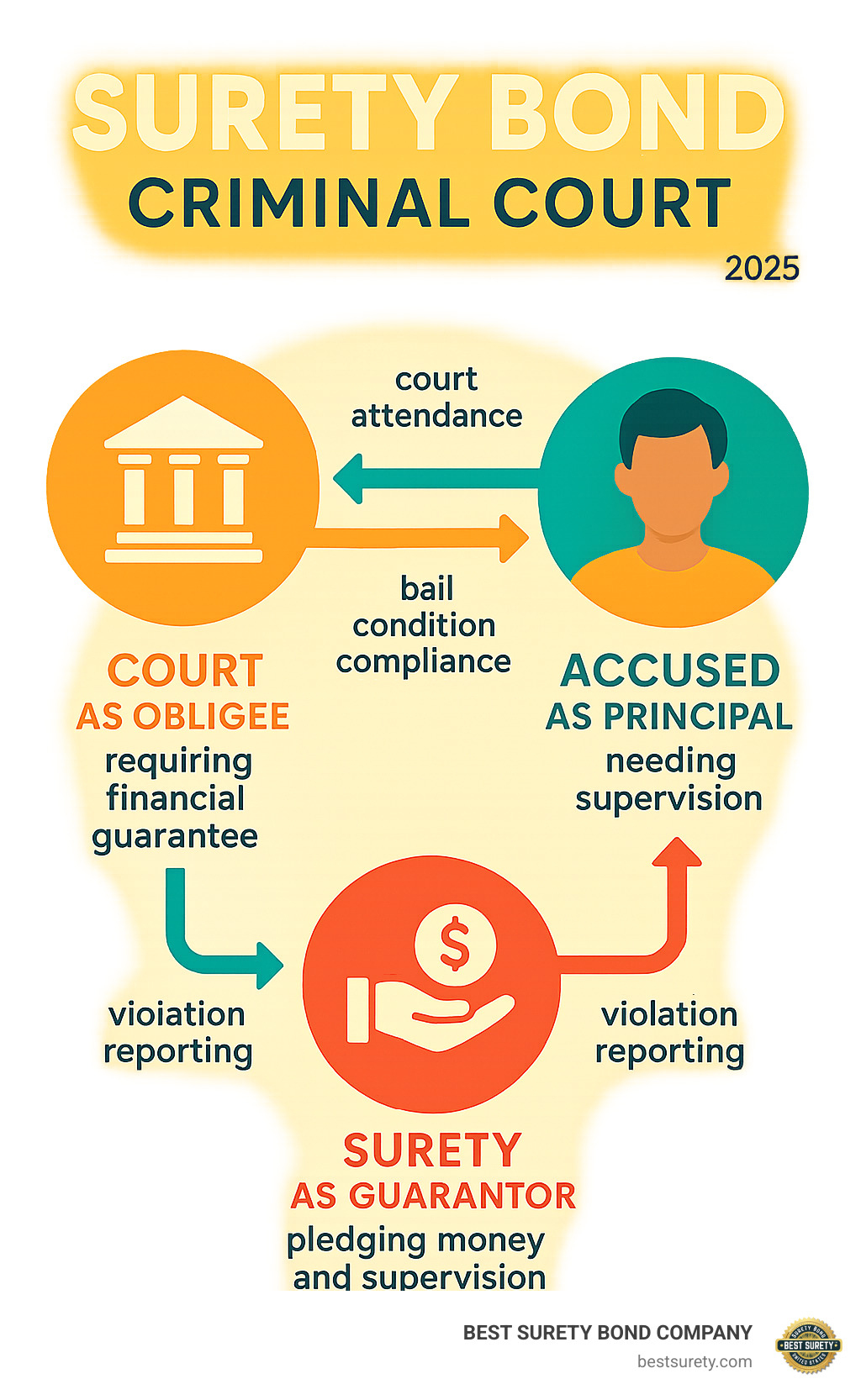Understanding the Role of a Surety in Criminal Court (Texas & Nationwide)

A surety bond criminal court arrangement involves three key parties: the court, the accused person, and the surety who guarantees the accused will meet their legal obligations. Here’s what you need to know:
Key Elements of Criminal Court Surety Bonds:
- Surety Role: Acts as a “civilian jailer” supervising the accused in the community
- Financial Guarantee: Pledges money to ensure the accused appears in court
- Legal Requirements: Must be 18+, financially stable, and able to supervise
- Responsibilities: Ensure court attendance, monitor bail conditions, report violations
- Consequences: Risk losing pledged money if accused fails to comply
When someone is charged with a criminal offense, the court may require a surety as part of the bail process. A surety is a person who comes to court and promises to supervise an accused person while they are out on bail. They also promise an amount of money to the court if the accused doesn’t follow bail conditions or doesn’t show up to court when required.
The financial stakes are real. If the accused doesn’t follow his or her bail conditions, it’s your job to call the police—and you may have to pay the court the money you promised when you agreed to be a surety.
This system follows what’s called the “ladder principle” of bail, where a recognizance with a surety is considered “one of the most onerous forms of release” and must be considered last after rejecting all other forms of release.
Who I am: I’m Haiko de Poel, an entrepreneur with over two decades of experience in financial services and legal technology. My background gives me deep insight into how surety bonds function within the criminal justice system and the practical challenges businesses and individuals face.

What is a Surety?
In the context of the criminal justice system, a surety is a critical component of the bail process. Essentially, a surety is a person or entity that agrees to take responsibility for an accused individual released from custody. They act as a “civilian jailer,” supervising the accused in the community.
A surety performs a dual role: supervision and financial guarantee. They promise to actively supervise the accused, ensuring adherence to all bail conditions. They also promise a specific amount of money to the court, which acts as a powerful incentive for the accused to comply. If the accused fails to follow bail conditions or appear in court, this pledged money could be forfeited.
While an individual can act as a personal surety, our expertise at BEST SURETY BOND COMPANY lies in providing commercial surety bond criminal court solutions. This involves a professional company guaranteeing the bond, which can offer significant advantages in terms of speed, reliability, and reduced personal risk for the accused’s family or friends.
Key Responsibilities of a Surety
Being a surety is a serious commitment that comes with significant responsibilities. The public interest and faith in the bail system require sureties to act promptly and faithfully in their duties. Our research highlights these primary responsibilities:
- Ensure Court Attendance: A surety must make sure the accused person goes to court when required. This means being aware of all court dates and ensuring the accused appears on time for every hearing until the case is completely over, which can sometimes take a long time.
- Monitor Bail Conditions: The surety is responsible for ensuring the accused person follows all the conditions set in their bail order. These conditions can vary widely, from curfews and restrictions on contact with certain individuals to prohibitions on consuming alcohol or drugs. The surety acts as a supervisor, actively overseeing the accused’s compliance.
- Report Violations to Authorities: This is a crucial and often difficult responsibility. If the accused person doesn’t follow any of their bail conditions, it is the surety’s job to call the police and report the breach. Failure to report bail violations can lead to serious legal repercussions for the surety, including the potential forfeiture of the pledged money.
- Communication with the Court: While not explicitly listed as a primary responsibility, maintaining open communication with the court or legal counsel can be vital. A surety may even be asked to testify in court about their ability to supervise the accused.
As you can see, being a surety is not a passive role. It requires active engagement and a full understanding of the commitment involved.
Who Qualifies to Be a Surety?
To become a surety, an individual must meet certain criteria designed to ensure they are suitable and capable of fulfilling their significant responsibilities. While specific requirements can vary by jurisdiction, especially between states or provinces, our general understanding, supported by extensive research, points to these common qualifications:
- Age Requirement: Typically, a surety must be at least 18 years old.
- Residency Status: In the United States, a surety is typically a citizen or legal resident of the state where the bond is being issued. For us, this means a strong focus on Texas residency, as courts prefer local sureties for easier supervision.
- Financial Stability: A surety must be capable of paying the bail amount set by the court, either through readily available financial resources or by pledging property. The court will assess their financial means to ensure they are “good” for the amount. This can include showing real estate in their name, bank accounts, and investments.
- No Criminal Record/Outstanding Charges: Generally, a suitable surety should not have a criminal record or any outstanding criminal charges themselves. They should also not be currently serving as a surety for another person.
- Relationship to the Accused: While not a strict qualification, the court will consider the surety’s relationship with the accused and their understanding of the responsibilities. The surety should be someone with sufficient influence over the accused to ensure compliance.
- Court Assessment: A judge or justice of the peace will decide whether an individual is suitable to act as a surety. They will look at the surety’s financial means, personal character, background, and their ability to supervise the accused effectively. If there are concerns about a surety’s ability to supervise—for example, if they believe the accused is a threat to their safety—they should not agree to be a surety.
Navigating these requirements can be complex, especially with Texas-specific surety requirements. This is where BEST SURETY BOND COMPANY steps in, offering clarity and professional assistance.
Navigating the Financials of a Surety Bond in Criminal Court
When most people hear about becoming a surety, their first thought is “How much will this cost?” The financial side of a surety bond criminal court arrangement can be overwhelming, but understanding your options provides peace of mind. You have two main paths: becoming a personal surety or working with a professional surety bond company like us. The difference in financial risk and stress is night and day.
What Financial Obligations Does a Surety Undertake?
When you step up as a personal surety, you are staking your personal assets on a person’s behavior. It is a serious financial commitment that goes far beyond just signing a piece of paper.
Here’s what you’re actually promising: You’re pledging a specific dollar amount to the court—this could be $5,000, $25,000, or even more depending on the charges. This isn’t money you pay upfront (unless the court specifically orders a cash deposit), but it’s money you’ll lose if the accused person doesn’t follow through on their obligations.
The court wants to know you can actually back up this promise. That means proving your financial means by showing bank statements, property deeds, investment accounts, or other assets. If you’re pledging $20,000, the court needs to see that you actually have $20,000 to lose.
The risk is real and personal. If the accused skips town or violates their bail conditions, you could face what’s called “forfeiture”—where the court takes the money you promised. While you’ll get a hearing to explain why you shouldn’t lose the money, there’s no guarantee you’ll keep it.
This is where working with BEST SURETY BOND COMPANY changes the game entirely. Instead of pledging your house or life savings, you pay us a small premium, and we take on the financial risk with the court. It’s like the difference between self-insuring your car versus buying auto insurance.
Surety Bond Company Services in Texas
After helping thousands of Texans, we’ve seen how much stress and financial exposure a commercial surety bond criminal court arrangement eliminates. When comparing going it alone versus working with professionals, the choice is clear.
With a personal surety, you’re putting your own assets directly at risk. Your home, your savings account, your investment portfolio—all of it could be on the line. You’ll also need to actively supervise the accused person, report any violations to police, and stay involved throughout the entire legal process, which can drag on for months or even years.
With BEST SURETY BOND COMPANY, you pay a non-refundable premium (typically just 1-10% of the total bond amount) and we handle the rest. No pledging your personal assets. No supervision responsibilities. No sleepless nights wondering if you’re about to lose your life savings.
Speed matters when someone’s in jail. While finding a suitable personal surety can take days or weeks (the court has to verify their assets, review their background, and approve them), we offer same-day approvals and can often get bonds issued within hours. Our online quote system means you can get started immediately, and our licensed agents in Texas understand exactly what local courts require.
We’ve designed our services specifically for situations like this. With over 10,000 clients bonded, we know how to steer Texas-specific requirements efficiently. Whether you’re dealing with Harris County courts in Houston or any courthouse across Texas, our local expertise combined with our national reach means we can handle your situation professionally and quickly.
The emotional burden alone makes commercial bonds worth considering. Instead of putting family relationships and personal finances at risk, you’re working with professionals who handle these situations every day.
Obtaining a Surety Bond for Criminal Court in Texas
Getting a surety bond criminal court through BEST SURETY BOND COMPANY is straightforward, especially when you’re dealing with the stress of someone being in custody. We’ve streamlined our process because we understand that time matters and complications are the last thing you need.
The application process starts online with our fast quote system, where you’ll provide basic information about the bond needed and some personal details. We keep this simple—no endless paperwork or confusing forms. Most applications can be completed in just a few minutes.
Our underwriting team reviews everything quickly. We look at factors like the nature of the charges, the bond amount, and your financial situation, but we’re designed to say “yes” whenever possible. We work with people in various credit situations because we understand that needing a bond doesn’t mean you have perfect credit or unlimited resources.
Premium payment is transparent and competitive. Once approved, you’ll pay a premium that’s a small percentage of the total bond amount. This is non-refundable (it’s our fee for taking on the risk), but it’s typically far less than what you’d risk as a personal surety. We pride ourselves on offering some of the lowest rates in Texas while maintaining the fastest service.
Same-day bond issuance is our goal. Once your premium is paid, we issue the bond directly to the court. Our relationships with courts throughout Texas, especially in the Houston area, mean we know exactly what each jurisdiction requires and how to get bonds processed quickly.
Collateral requirements are minimal for most bonds. Unlike personal sureties who need to pledge significant assets, most of our criminal court bonds require only the premium payment. For larger or higher-risk situations, we might need some additional security, but we’ll discuss this upfront—no surprises.
For more detailed information about our complete range of court bond services and how we can help with your specific situation, visit our dedicated page: More info about court bond services.
Texas-specific procedures matter, and that’s where our local expertise really shines. Different counties have different requirements, different forms, and different timelines. Our licensed agents know these details inside and out, which means faster approvals and fewer delays when someone’s freedom is on the line.
The Legal Process and Consequences for Sureties

When you’re dealing with a surety bond criminal court situation, understanding the legal framework isn’t just helpful—it’s essential. The system operates on well-established principles designed to balance fairness with accountability, but the consequences for non-compliance are serious and far-reaching.
Think of the legal process as a carefully structured ladder, where each rung represents a different level of restriction and responsibility. As we’ll explore, this system affects everything from how surety requirements are determined to what happens when things go wrong.
How the ‘Ladder Principle’ Affects Surety Requirements
The legal system operates on the “ladder principle” of bail, ensuring courts don’t jump to the most restrictive release conditions without justification. This principle is fundamental to understanding why a surety bond criminal court arrangement might be required.
Here’s how it works: courts must start with the least onerous form of release and work their way up. They can’t impose a more restrictive condition unless they can show why a less restrictive option won’t work. It’s like building a case, step by step.
The progression typically follows this pattern: unconditional release comes first—simply a promise to appear in court. If that’s not sufficient, the court moves to recognizance with conditions like curfews or no-contact orders. When those aren’t enough, we reach the surety level.
A surety requirement represents a higher-level restriction on the ladder. By the time a court requires a surety, they’ve essentially determined that less restrictive options won’t adequately ensure the accused appears in court or protect public safety. This is why justification for surety requirements must be clearly established in the legal record.
For those interested in the detailed legal framework, you can review The ‘ladder principle’ in bail law. Understanding this principle helps explain why surety bonds are taken so seriously by the courts—they’re not the first option, but rather a carefully considered step up the ladder of legal protections.
Consequences of a Breach for a Surety Bond in Criminal Court
When someone fails to comply with their bail conditions or simply doesn’t show up to court, the ripple effects are immediate and serious. The consequences don’t just affect the accused—they directly impact the surety who guaranteed their behavior.
If the accused absconds or violates their bail conditions, the court will typically schedule what’s called a forfeiture hearing (sometimes referred to as “estreatment”). This isn’t just a formality—it’s your opportunity as a surety to explain why the money you pledged shouldn’t be taken by the court.
During this hearing, you must demonstrate that you fulfilled your supervisory responsibilities and the breach wasn’t due to your negligence. If the court finds you failed in your duties, you’ll face paying the pledged amount.
The legal action against the surety can extend beyond just forfeiting the bond amount. If you used a commercial surety bond company like BEST SURETY BOND COMPANY, and we had to pay the court on your behalf, you’d be legally obligated to reimburse us under the indemnity agreement. Failure to repay could result in legal action and significantly impact your credit rating.
What makes this particularly challenging is that the public interest requires sureties to act promptly and faithfully. The courts depend on this commitment to keep the bail system functioning effectively. There’s no room for “I didn’t know” or “I thought someone else was watching.”
A Surety’s Legal Protections and Recourse
While being a surety carries significant responsibilities, you are not without options if circumstances change. The legal system recognizes that situations evolve, and there are established processes for withdrawing as surety when necessary.
The most straightforward option is applying for surety relief. This involves going to the courthouse and formally requesting to be removed from your surety obligations. It’s not something to take lightly, but it’s a legitimate recourse when you can no longer fulfill your supervisory role effectively.
Another option is rendering the accused to custody—essentially bringing the accused person to court and asking to be released from your obligations. This action effectively revokes their bail, but it protects you from ongoing liability. The process for removal typically involves the court issuing a surety warrant for the accused person.
The effect on the accused is significant: they’ll likely be arrested and returned to custody. They’ll then need to arrange new bail conditions, possibly with a different surety or through a commercial bond company. While this might seem harsh, it’s sometimes the only practical solution when the original surety arrangement isn’t working.
In some cases, substitution of surety is possible, where a new surety takes over your obligations, effectively releasing you from responsibility. However, this requires court approval and a suitable replacement.
Given the complexity and potential consequences, we strongly recommend seeking independent legal advice before agreeing to be a personal surety. Understanding the full scope of your commitment and potential liabilities is crucial before signing any recognizance.
For those working with BEST SURETY BOND COMPANY, while premiums are generally non-refundable once a bond is issued (since the service has been rendered), any collateral for judicial bonds is typically released after the case concludes and all conditions are met. This is just one of the ways commercial surety bonds can provide more predictable outcomes than personal surety arrangements.
Frequently Asked Questions about Criminal Court Surety in Texas
When dealing with a surety bond criminal court situation, you’re likely facing questions that keep you up at night. We understand this is often uncharted territory for most people, and the stakes feel incredibly high. Let me walk you through the most common concerns we hear from clients across Texas and beyond.
What happens if the person I am a surety for is arrested on new charges?
This is a serious situation, but your responsibilities for the original bail don’t disappear. You made a promise to the court about the original charges, and that promise stands regardless of what happens next.
The court will likely take a fresh look at the entire situation. They might schedule a new bail hearing to consider whether the original bail conditions are still appropriate given the new circumstances. This is where things can get tricky, because you’ll need to decide if you’re comfortable continuing as a surety knowing there are additional charges in play.
Here’s the key point: the new arrest doesn’t automatically let you off the hook. Your financial obligation and supervision responsibilities for that first case continue until the court formally releases you or the case concludes. This is exactly why many people find working with BEST SURETY BOND COMPANY to be a smarter choice—we handle these complex situations professionally, so you don’t have to steer the emotional and legal maze alone.
Can I be a surety if I live in a different state, like outside of Texas?
You’re not automatically disqualified, but it is an uphill battle. Texas courts strongly prefer local sureties because supervision is a core duty. How can you effectively monitor someone’s compliance from hundreds of miles away?
If you’re determined to pursue this route, you’ll need to convince the court that distance won’t compromise your ability to supervise. This might mean demonstrating a very close relationship with the accused, having a detailed communication plan, or showing you can visit Texas regularly. Even then, many courts will be skeptical.
Here’s where we see the most success: out-of-state family members who want to help often find that using a Texas-based surety bond company like ours is the most practical solution. We’re licensed in all 50 states, but we have deep local expertise here in Texas. We understand Houston courts, Dallas procedures, and Austin requirements. This means your loved one gets the local supervision and professional guarantee the court wants, while you avoid the geographical complications that could derail a personal surety arrangement.
Is the money I pledge as a surety returned?
This question gets to the heart of the financial stakes. If everything goes perfectly, yes, your pledged money comes back to you. When the accused attends every court date and follows all conditions, the court releases your financial obligation.
But here’s what keeps people awake at night: if there’s any breach, any missed court date, any violation of conditions, you risk losing the entire amount you pledged. We’re not talking about a partial penalty—it’s potentially the full amount you promised to the court.
This is where the difference between personal surety and commercial bonds is clear. With BEST SURETY BOND COMPANY, you pay a non-refundable premium for our service. You are not personally on the hook for the full bond amount. Any collateral we required is returned to you once the case concludes and all conditions are met.
The peace of mind that comes with transferring that massive financial risk to a professional surety company? That’s often worth far more than the premium you pay.
Get Your Court Bond with Confidence in Texas

When you’re facing the complexities of securing a surety bond criminal court, you need a partner who understands both the urgency of your situation and the intricacies of the Texas legal system. That’s exactly what BEST SURETY BOND COMPANY delivers—professional expertise wrapped in genuine care for your circumstances.
We’ve built our reputation on three core promises: fast approvals that get you moving quickly, affordable rates that won’t strain your budget, and reliable service you can count on when it matters most. Having bonded over 10,000 clients across Texas and nationwide, we’ve seen how stressful these situations can be, and we’re here to make the process as smooth as possible.
Our Texas expertise runs deep. As Houston’s trusted surety provider, we understand the specific requirements of Texas courts, from Harris County to rural jurisdictions across the Lone Star State. Our licensed agents know the local procedures, the typical processing times, and exactly what documentation courts expect. This local knowledge translates into faster approvals and fewer complications for you.
But we’re not just a Texas company—we’re licensed in all 50 states, which means we can help you whether you’re dealing with a case in downtown Houston or need coverage for someone in another state. Speed and convenience are at the heart of what we do. Our online quote system can get you started immediately, and we often provide same-day issuance because we know time is critical in criminal court situations.
The financial advantages are clear. Instead of risking your personal assets as a surety, you pay us a small, non-refundable premium and we handle the financial guarantee to the court. This approach protects your home, savings, and other assets while still meeting the court’s requirements. We work with clients in various credit situations, understanding that not everyone has perfect financial standing during challenging times.
Ready to move forward with confidence? Our professional service takes the emotional burden off your shoulders while ensuring all legal requirements are met properly.
Get Your Free Court Bond Quote Now


